The Evolution of Lana Del Rey
A non-chronological look at the career of a major American pop artist.
intro to Lana
Lana Del Rey first came onto the scene nearly fifteen years ago, with her 2011 viral sensation “Video Games,” and her disastrous SNL performance of said song in January 2012, shortly before the release of her debut album Born To Die. The project was an oddball mixture of trip-hop production, anthemic pop choruses, and string-heavy orchestral arrangements. It was full of Lolita lyrics and coke lyrics and I-love-older-men lyrics, suffused throughout with a heavy dose of Americana; Lana has always shown a thematic lust for Marilyn, Gatsby, Route 66. That kind of stuff.
Pitchfork gave Born To Die a 5.5/10 and derided her for making shallow songs that didn’t interrogate the pop iconography she loved. Lana wasn’t feminist enough; she wasn’t indie enough. Since then—Lana has released nine full-length albums and seven EPs in the intervening years—the critics have come around. The 2014 album “Ultraviolence” was a big turning point, as Lana worked with Dan Auerbach from The Black Keys to craft a lush, late-60s wall of sound that provided a powerful backdrop for her strange singing choices and darkly romantic lyricism.
Since “Ultraviolence,” Lana has occupied a more-or-less unique niche in the world of pop music. She is deeply cool and insanely famous, despite sidestepping the normal demands that audiences place on female pop stars. She doesn’t have radio hits, nor does she try for them. She doesn’t date famous people; in fact, she recently married a mid-50s alligator tour guide from Florida named Jeremy Dufrene.
the music in 2019
For my money, Lana’s best album is Norman Fucking Rockwell!, the 2019 full-length masterpiece she released in collaboration with megaproducer Jack Antonoff. His intuitive, minimal production is the perfect foil for Lana’s expansive songwriting and nouveau-Winehouse singing. What scanned as camp in her earlier work comes across in NFR! as sincere, searching interrogation of pop iconography—including herself, as pop icon.
From the best track on NFR, “hope is a dangerous thing to have:”
I've been tearing around in my fucking nightgown
24/7 Sylvia Plath
Writing in blood on the walls
'Cause the ink in my pen don't work in my notepad
Don't ask if I'm happy, you know that I'm not
But, at best, I can say I'm not sad
'Cause hope is a dangerous thing for a woman like me to have
Calling yourself “24/7 Sylvia Plath” is self-deprecating and self-mythologizing all at once, and the milleniallized Internet phraseology of “24/7” only further layers the lyrics with the self-aware irony that she spreads like bitter frosting all over the album’s sweet-sounding songs. Later in the song, she delivers the hilarious: “Hello, it’s the most famous woman you know on the iPad.” This is what distinguishes late-era Lana from early Lana: the ironic self-awareness, the acidic humor.
the music in 2012
Let’s take it back to 2012 so you can see what I mean, so you can see where she started. From Born To Die, there’s “Carmen:”
Only seventeen, but she walks the streets so mean
It's alarming, truly
How disarming you can be
Eating soft ice cream
Coney Island queen
She says, you don't want to be like me
Looking for fun, getting high for free
I'm dying, I'm dying
I don’t hate this song, but it isn’t very good, either. It’s a cautionary tale about a teenage girl who drinks too much, does too many drugs, and ends up as a prostitute, walking the streets for her fix and pretending to be happy. It’s the pop song version of “Go Ask Alice.” It never achieves the sort of thoughtful interiority Lana aims for, because it’s too generic.
Of course, Born To Die isn’t all bad. “Off To The Races,” sung from the perspective of a sugar baby dating an older man, is a powerfully hedonic trip-hop song about the party-girl lifestyle. And don’t even get me started on “Ride,” a stunning torch song about life on the road that, to this day, makes me want to buy a motorcycle and take off down the highway in the middle of the night.
But these songs—even the ones that I like—are deadly serious, and this is what made the critics (and some listeners) bristle. This was a singer-songwriter out of nowhere, emerging from the foam of the internet, announcing that she was not only a pop star but also an important writer, a chronicler of the American condition. All this, at 24 years old.
Of course, Lana was right about all that. But it took some time for her to learn to write songs that could bear the weight of her internal expectations, music that stood up to her lofty artistic goals.
the music in 2023
Fast-forward 11 years, to the 2023 album Did you know that there’s a tunnel under Ocean Blvd, and to the first single from that album, “A&W.”
I haven't done a cartwheel since I was nine
I haven't seen my mother in a long, long time
In 2012, Lana was crafting elaborate story-songs like “Carmen” about young women who become prostitutes, positioning her characters as grand symbols of American decay. By the time she writes “A&W,” she’s matured a great deal as a writer, and understands that real emotional disclosure is often tangential. She delivers these words in a talky, subdued cadence, like she’s just telling us two facts: she hasn’t done a cartwheel since she was a kid, and it’s been a long time since she saw her mother.
I mean, look at me, look at the length of my hair
My face, the shape of my body
Do you really think I give a damn what I do
After years of just hearing them talking?
The vocal approach here changes immediately, as Lana enters a breathy sexpot falsetto; but she’s after something more complicated than sex appeal here. When Lana re-entered the public eye after the pandemic, she had gained some weight. This generated a frankly grotesque amount of discourse on social media. Some of it was mean-spirited; some of it was body-positive. This is a song about Lana’s ownership (or lack thereof) over her body, and these lyrics set the table for that topic.
I say I live in Rosemead
Really, I'm at the Ramada
It doesn't really matter
Doesn't really, really matterCall him up, come into my bedroom
Ended up, we fuck on the hotel floor
It's not about havin' someone to love me anymore
This is the experience of bein' an American whore
Rosemead is in Southern California, but it’s far from glamorous. Rosemead is to Los Angeles as Skokie is to Chicago, or Kent is to Seattle. The Rosemead/Ramada distinction is, I think, about the contrast between domestic stability and transitive hotel life. She doesn’t actually have a place that she calls home; she just has the hotel where she’s staying for the night, the place where she has casual sex, the place where she behaves in the seedy way befitting an “American whore.”
“American whore” is a loaded term, especially in the context of Lana Del Rey, whose sexuality and self-possessed femininity has been a hot topic since she came on the scene in the early 2010s. Lana has never been seen as a feminist, at least not in the mainstream liberal do-gooder sense. She sang about sleeping with older men from the very start, and publicly dated Axl Rose early in her career. On the title track from Ultraviolence, she sang that “he hit me and it felt like a kiss,” which seemed to be a callow endorsement of domestic violence. (Critics at the time missed the reference to “He Hit Me (And It Felt Like A Kiss)” by girl-group The Crystals.)
I mean, look at my hair
Look at the length of it and the shape of my body
If I told you that I was raped
Do you really think that anybody would think
I didn't ask for it? I didn't ask for it
I won't testify, I already fucked up my story
Lana re-enters that light, falsetto register here while she delivers a devastating set of lyrics. I wouldn’t call this an admission from Lana, or claim to know anything about her experience as a woman. Maybe it’s just a thought experiment, an awareness of the way women are silenced. But it’s a painful, gorgeous way to approach an unapproachable topic. Her vocal approach stands out here. The way she swallows the word “raped,” making it hard to hear. The way she sounds breathless, like she’s about to pass out.
“A&W” is basically two songs. The final chorus repeats: “This is the experience of bein’ an American whore,” over and over, but the vocals start to fade into the background, further distorted by autotune and the rising mix of the backbeat. The last three minutes or so feature Lana casually rapping simplistic, catchy bars about a problematic boyfriend.
Jimmy only love me when he wanna get high
Jimmy only love me when he wanna get high
Your mom called, I told her, you're fuckin' up big time
“A&W” touches on Lana as a public figure, Lana as a sex object, Lana as a victim of sexual violence, Lana as a willing participant in degrading casual sex. And it ends with a three-minute rap song about getting high with a shitty boyfriend. This shouldn’t work, really, but it does more than work.
It is a gorgeous, soaring piece of autobiographical art that resists easy analysis and rewards deep reading. It is bizarre and affecting, and it doesn’t have any clear reference points in the last five years of pop music. Its closest relative is likely Blonde, Frank Ocean’s 2016 magnum opus, which took a similarly deconstructed (or post-construction) approach to popular songwriting.
the music in 2025
In 2024, Lana Del Rey started talking about her next album, which would be a country album called Lasso. I was intrigued by this as a big fan of country, although my anticipation was tinged with a bit of skepticism. These days everyone from Ed Sheeran to MGK to Beyonce is dipping their toes in the country pond, and the results rarely justify the pivot, or even deserve the label “country.”
2024 came and went without any singles for Lasso, although there was a forgettable Quavo collaboration called “Tough,” which Lana—notably—did not write herself. In August of last year, she clarified that Lasso wouldn’t be a major stylistic departure:
“If anything, it will just be a little lighter lyrically, and more pointed in a classic country, American, or Southern Gothic production — which again, so many of my songs already are.”
In November of 2024, the album—now re-titled to The Right Person Will Stay—was announced and slated for May 21st, 2025. On April 11, 2025, she released the album’s first single “Henry, Come On,” and announced that the album would be delayed and re-named again. Such is the artistic output of Lana Del Rey; her fans have long-ago learned to just listen to the music and hope more of it comes out soon.
If “Henry, come on” is indicative of the new album, I fear that I will not have nice things to say about it. This is a decent ballad about telling a lover not to worry too much. It is also completely unremarkable, landing Lana in a severely downtempo pop-country niche, with lyrics totally blunted of her usual wit and clever wordplay. It sounds like Lana sat down to write a “Lana Del Rey” song, and infused it with a series of bland country elements: “blue jeans,” “cowgirl,” and “Houston” are all mentioned.
The song was co-written with Nashville impresario Luke Laird, who has worked with Sam Smith and Kacey Musgraves; this sounds, appropriately, like a slowed-down Kacey outtake. But Kacey has a playful, country-girl vocal approach that makes her songs fun, even when they lean generic. Lana’s narcotized, mournful singing just does not work in this context. Every album has its mediocrities, but was this really the best single they could have released?
Without being facetious: in what sense is “Bluebird” a country song? Is it the harmonica that comes in at the end? Is it the fact that she’s wearing a white lace dress on the artwork? These are the vaguest genre signifiers that exist; it’s like holding a gun and calling yourself a rapper. “Bluebird,” unfortunately, doesn’t improve on the weaknesses of “Henry, come on.” It is even more lyrically broad than “Henry, come on,” offering a broad, symbolic story about a bird leaving the nest / a woman leaving her abusive lover. It doesn’t leave much of an impression on the listener.
where does she go from here?
For well over a decade now, Lana Del Rey has been one of the most provocative, prolific, and interesting pop songwriters that American music has to offer. Nine albums, most of them very good, with a few stone-cold classics thrown in, is nothing to sneeze at. But as the summer of 2025 kicks off, Lana is married, happy, and making perhaps the worst music she’s ever made.
She may be entering the “I make boring, fake country music” era of her career. I hope that it’s a brief one, and I hope she enjoys it. In the meantime I’ll be listening to the LDR classics, and occasionally writing about them. There’s no one quite like her.

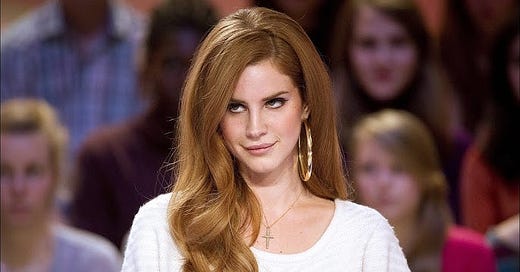



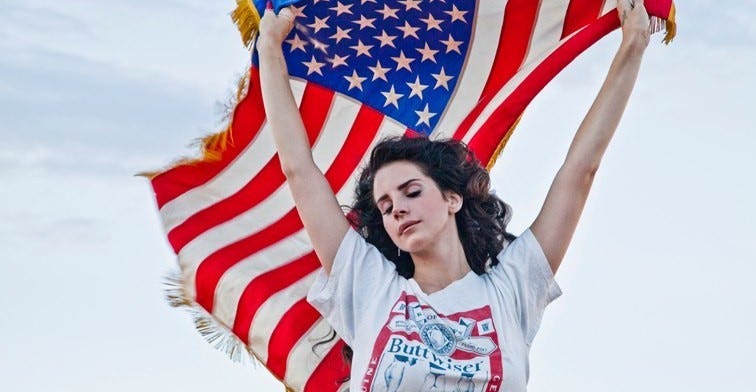
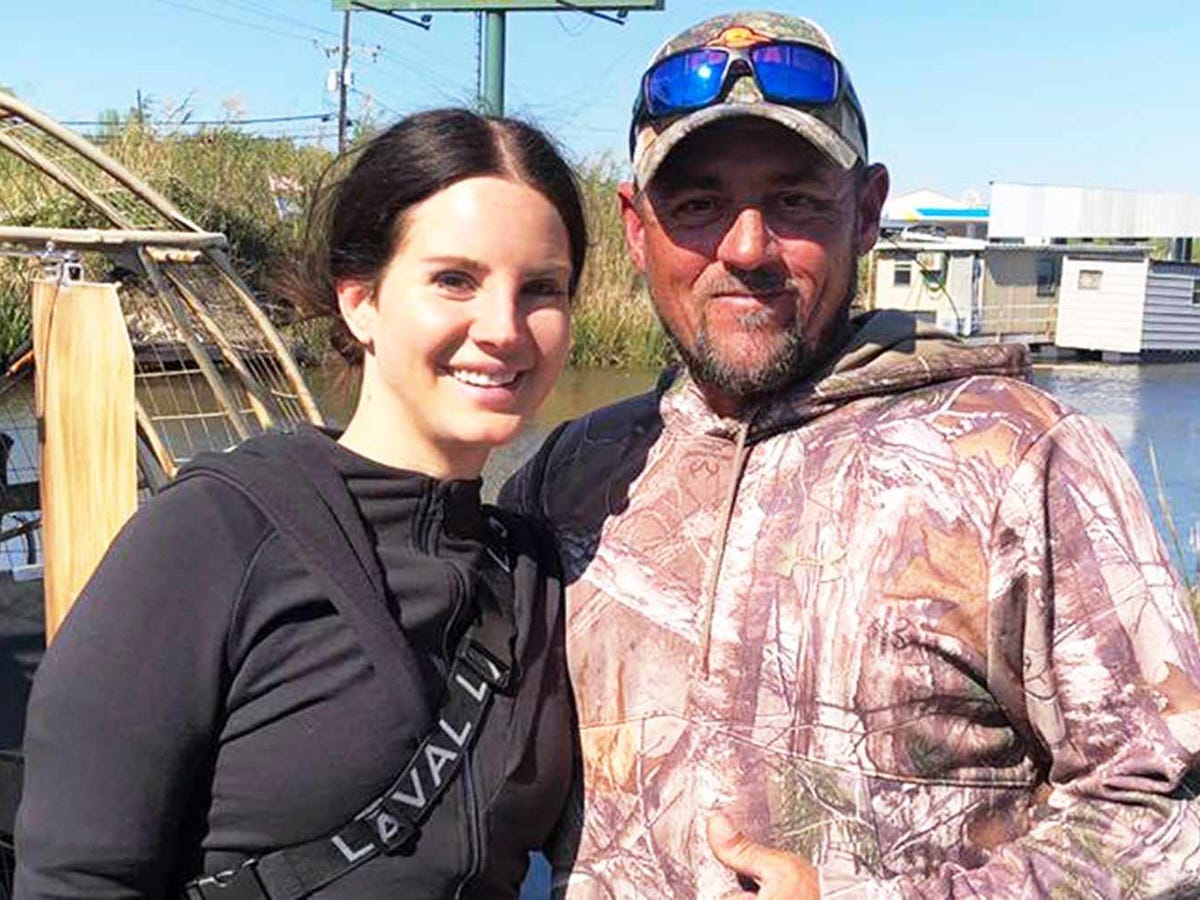
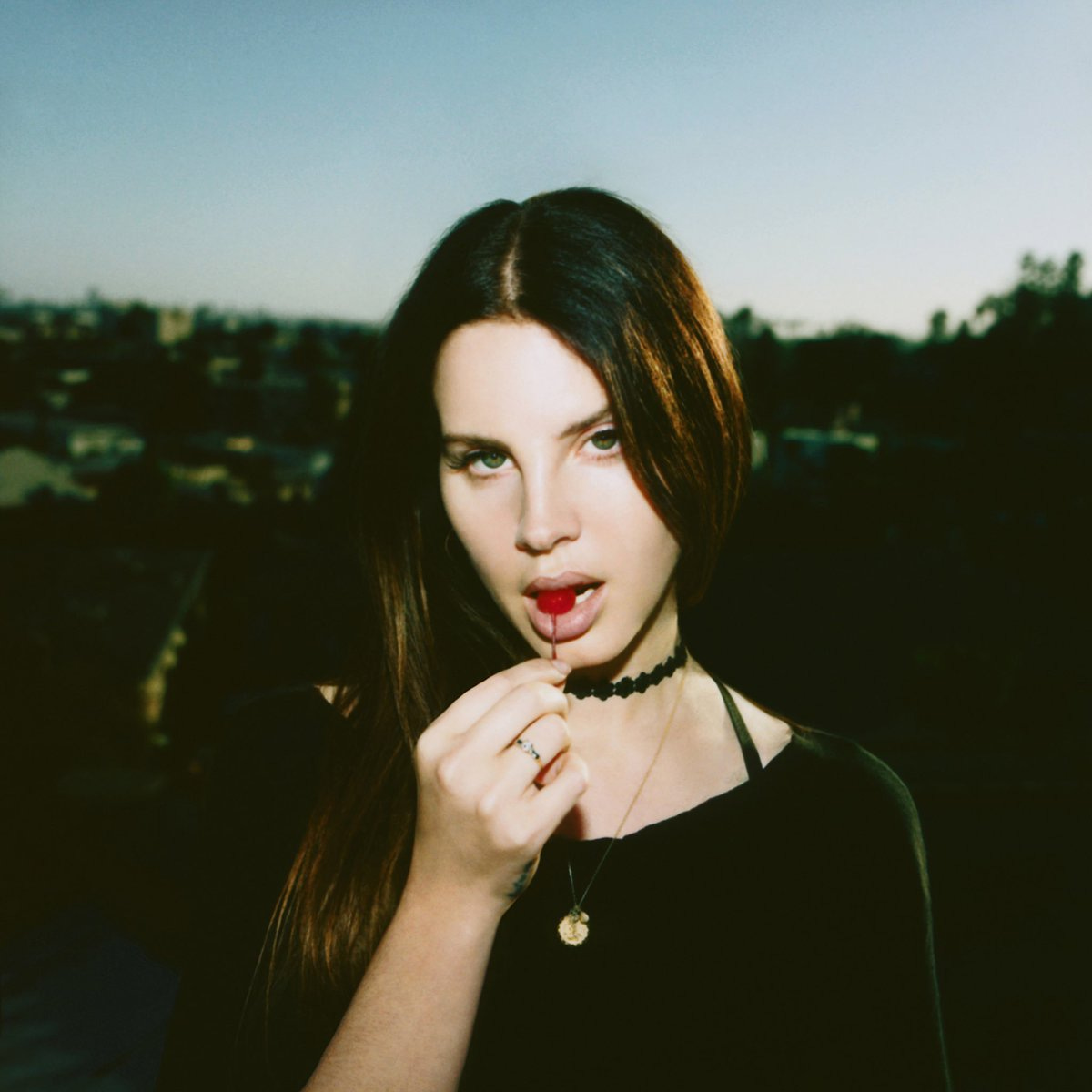
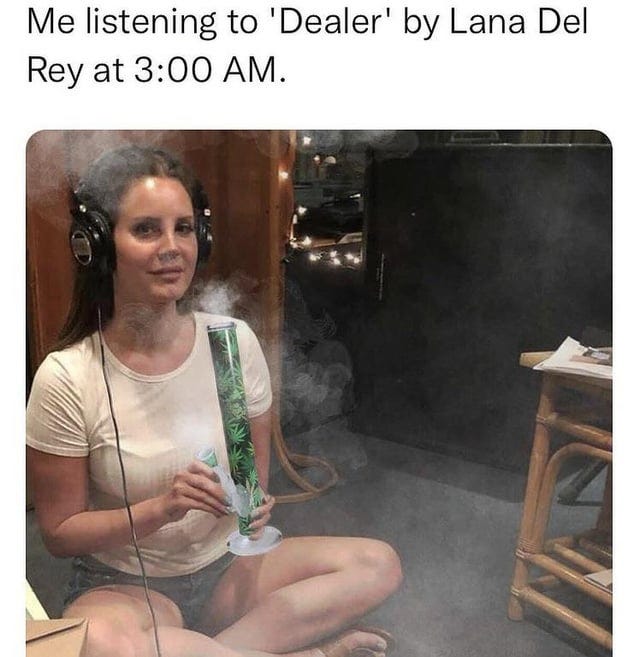
Thank you for this piece. I have been obsessed with Lana for the past coupla years. (And I’m someone who finds most contemporary music to be utterly unremarkable. I spend most of my time in the Dylan catalogue, and early 70’s Dead. And Beethoven.) To me, the nearest correlative is early Tori Amos, her first three albums and the next few, remain to my mind, a high-water mark, the height of what music can do, emotionally, spiritually. Lana, at her best, almost reaches the heights that Tori reached.
Her understanding of sonic complexity, her intimate and at times brilliant lyrics, her voice! are utterly transporting.
“Grandfather please stand…” is among the most beautiful songs of the last decade.
“Mariners,” too, is a perfect thing.
I agree with you on A&W. I fucking love everything about it, even, especially, it’s ending.
“Paris” “Taco Truck” there’s just one masterpiece after another.
I find her early stuff, like you, to have intimations of what’s to come, but there’s no question her mature work is far better.
But I do love the melancholy “Henry, come on.” Not so much lyrically, it’s alright, but it’s moody melody and vocal performance.
Anyway thanks for the piece. I appreciate a “serious” appreciation for an artist of the highest caliber. It makes me a little mad that she isn’t take “seriously.” I think she’s among the greats of contemporary music.
A few years ago I read an unintentionally hilarious Harper's Bazaar essay with a classic woke headline: "Lana Del Rey Can't Qualify Herself Out of Being Held Accountable."
So then I started rewriting Lana's lyrics to make them more woke and appease her critics.
"They say I'm too young to love you /
I'm white fragile femininity.
They say I don't understand /
Intersectionality.
I think I'm too cool to know ya /
I have a liberal arts degree.
I'm churning out monographs /
faster than Ibram X. Kendi."